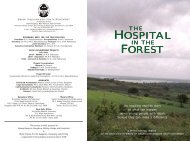Janaagraha - Resource Communications Pvt. Ltd
Janaagraha - Resource Communications Pvt. Ltd
Janaagraha - Resource Communications Pvt. Ltd
Create successful ePaper yourself
Turn your PDF publications into a flip-book with our unique Google optimized e-Paper software.
J A N A AG R A H A C E N T R E F O R C I T I Z E N S H I P A N D D E M O C A R C Y<br />
L E A D E R S H I P P R O G R A M M E S<br />
24<br />
25<br />
In the alphabet of democracy, we all<br />
move from "E" to "F": elect and<br />
forget. We need to stay on the letter<br />
"E", elect and engage.<br />
<strong>Janaagraha</strong> conceived the idea of<br />
ward level federations to create<br />
grassroots networks amongst<br />
Resident Welfare Associations<br />
(RWAs), citizens, local businesses,<br />
educational institutions etc. The<br />
following federations have been<br />
established:<br />
Abhyudaya - Ward 55<br />
Abhaya - Ward 54<br />
Shreyas - Ward 64<br />
Pace - Ward 78<br />
Forward 68 - Ward 68<br />
Jago - Wards 90 & 94<br />
Jana Vyapti - Ward 18<br />
<br />
Ward 74 Citizens' Forum<br />
Suprajaa - Ward 50<br />
J A N A A G R A H A C O M M U N I T Y L E A D E R S ’ N E T W O R K<br />
Grassroots Leadership Support<br />
This is a group of individual community champions who have participated in<br />
<strong>Janaagraha</strong>’s grassroot initiatives and shown commitment in bringing about change at<br />
their local level. <strong>Janaagraha</strong>’s belief is that this network has the leadership capacity to<br />
be agents of change beyond the limits of their individual ward boundaries. Having<br />
internalised the work, values and goals of <strong>Janaagraha</strong>, they will add significant value<br />
and have shown willingness to further JCCD’s goals. The network has run a city-wide<br />
campaign on Taxation with Transparency, spearheaded ward sabhas in their own wards,<br />
created federations of Resident welfare Associations (RWAs) and helped in spreading<br />
the message of participation in other parts of the city and state.<br />
WA R D S A B H A / A R E A S A B H A<br />
Change Your Ward to Change Your World<br />
Two important Amendments to the Constitution in 1994 introduced the twin towers of<br />
decentralised government: the 73rd amendment for rural India and 74th amendment<br />
for urban India. Both are dysfunctional but for different reasons. In rural India, while<br />
every villager is a member of the gram sabha with a formal voice in decentralised<br />
decision-making, the tower is hollow, since the capacity for participation is inadequate<br />
and a feudal society acts as a negative force. In urban areas, the capacity for<br />
participation is in abundance but the ground floor of the tower is missing, with no<br />
legitimacy for citizens to participate. Hence in urban India, democracy is allowed only<br />
at the ballot box.<br />
<strong>Janaagraha</strong>'s energies have focused on citizen participation in urban local issues in<br />
two ways:<br />
The first is to facilitate informal platforms for regular citizen engagement with local<br />
government on issues related to ward budgeting and development. These have been<br />
called Ward Sabhas. Currently, citizen communities in 16 out of 100 wards, hold ward<br />
sabhas every month with varying processes and varying degrees of success.<br />
The ward sabhas provide real-time opportunities for local level leadership to emerge<br />
and engage. The focus of <strong>Janaagraha</strong>’s ward sabha programme is on streamlining the<br />
process and tools to maximise participation, efficiency and outcomes. For example,<br />
<strong>Janaagraha</strong>’s ward-online system, Janasambandha, provides the technology platform to<br />
track citizens’ complaints and government responses. This is a key tool in managing<br />
community grievances. However, ultimately the success of the citizen participation in<br />
urban areas will depend upon three factors: citizen tenacity in participating for a better<br />
quality-of-life in their neighbourhoods, enlightened self-interest on the part of the<br />
corporators, and a legal provision institutionalising citizen participation.<br />
There are two repeated arguments against citizen participation: the first is that the<br />
urban citizen is self-centered and doesn’t really care; the second is the argument about<br />
the sheer size of the urban population making participation unwieldy and<br />
unrepresentative. To the first argument: the presumption of apathy cannot be a tenable<br />
reason for denying a legitimate role for the urban resident. In fact, giving a role to the<br />
citizen places accountability on him as well.<br />
To the second argument: <strong>Janaagraha</strong> has proposed a simple solution—the Area<br />
Sabha. Each boundary is defined by individual polling station footprints. The polling<br />
footprint is the lowest political demarcation based on household numbers of<br />
approximately 1000 voters, which translates to about 300 households per polling<br />
booth. Participation embedded around the polling station footprint ensures that<br />
decentralisation is not too large to be cumbersome and not too small to be<br />
insignificant. Every registered voter within each area will have an opportunity to<br />
participate through Area Sabhas thus allowing equitable representation. The new ward<br />
committee would therefore need to include nominated citizen representatives from<br />
each Area Sabha in the Ward Sabhas.<br />
<strong>Janaagraha</strong> has drafted a new model—Municipalities Act—that includes a Nagara Raj<br />
component. This Nagara Raj component gives every registered urban voter a formal role<br />
in the democratic process through the establishment of area sabhas. The Nagara Raj can<br />
be introduced as an amendment to the existing municipalities act or as part of the new<br />
Model Municipalities Act. We have been making steady progress in advocating this<br />
change with governments at different levels across the country.<br />
V O T E R L I S T S A N D E L E C T I O N T U R N - O U T<br />
The Starting Point in a Democracy<br />
While there are important electoral reforms required in the country, such as candidate<br />
disclosure and affidavits and barring candidates with criminal records, the starting point<br />
for citizens participating in the representative democratic landscape, is the ability to cast<br />
their vote. In an aggregate democracy like ours, high voter turnout is critical, especially<br />
in electing the local corporator where the margin of victory is sometimes as low as three<br />
votes. This programme is focused on elections from the viewpoint of the citizens.















